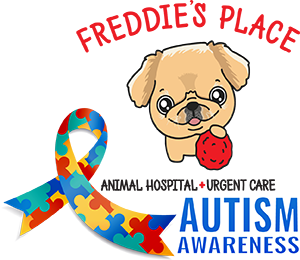 A FreddieSez Pet Health Alert Special Edition
A FreddieSez Pet Health Alert Special Edition
Reports of a “mystery” illness impacting dogs in at least 15 states has health officials and veterinary experts baffled. This respiratory illness appears to be spreading and, as of now, there is little known about it, and to date there is no known medication that will counteract or prevent infection. Reports of “some dogs” dying from it are growing, but no real numbers have been reported at this time.
What experts do know is that illness is likely due to a bacteria or virus. The illness seems to take root quickly, starting as a cough that grows in intensity, and takes weeks to months to subside. In some cased the cough turns into pneumonia, which taxes the animals immune system and causes difficulty in breathing. The illness ramps up very, very quickly and appears to be either spread via contact, shared food or water supplies, or it could even be airborne. At this point, there is no documented treatment for the illness and it is not responding to antibiotics.
Since the fall, critical and urgent care facilities have reported an influx of cases, but most states are not formally tracking it as a unique illness. Of those facilities that recognize the symptoms and are attempting to treat this as a respiratory disease, the number of canine patients showing signs has not slowed. Once this illness is in a community, the number of reported cases quickly rises, so the spread it not easily contained at this time. One of the most concerning issues is that there are untold cases that are not being reported, as the animals are not being seen by veterinarians, so there is no real way to grasp accurate numbers on how many dogs have contracted the illness. The illness seems to have no “target” group, as all breeds, ages, and sizes of dogs are impacted. The Oregon Department of Agriculture has, reportedly received confirmation of over 200 cases of this illness in mid-August through mid-November.
As of 11/16/23 the following states have reported cases of the mystery illness; Oregon, Colorado, California, Illinois, Florida, Georgia, Indiana, Massachusetts, Washington, Vermont, Maryland, Idaho, New Hampshire, Rhode Island, Tennessee. Again, many states are not keeping records of this as a unique disease as of yet and there are an unknown number of cases from owners who have not sought veterinary assistance for their animals.
Know the Symptoms
If you see the following signs in your dog, call your primary care veterinarian immediately
** act quickly, as some dogs move from these stages to pneumonia symptoms very fast. Dogs with severe pneumonia that does not respond to antibiotics often have poor outcomes in as little as 3 days.
What Can I do to Help my Dog Avoid Contracting this Illness?
Veterinarians and Health Officials are stressing that now is NOT the time for panic or knee jerk reactions. Concern is warranted but there is no need to become paralyzed with fear for your pet. Although reported cases of the illness seems to be growing, there are very few patients who are not recovering fully at this time. To help keep your pet safe, the following precautions may be taken
If you are in a situation where kenneling or Doggy Daycare is a requirement due to work or scheduling, ask the owners and staff what they are doing to assure cleanliness and safety from the virus spreading. You’ll want to hear that they are performing more, targeted disinfecting of their common areas, beds, and kennels. There should also not be common water and food sources available for mass usage. Also, they should be able to tell you if the facility has any reported cases of the illness among their clients.
The Good News
Some scientists believe the cause of the outbreak is from a “funky bacterium” that has never been seen before. This opinion was gained from the study of tissue samples taken from dogs in three different states, so there is a common baseline. (A bacterium is a single-celled or noncellular organism that lacks a cell nucleus and may have different shapes and modes of movement) This particular bacterium is smaller in size than most, making it difficult to to find and sequence (break down it’s DNA code and create a treatment). Although scientist stress that the common factors found in these samples may not be what is causing the illness in all reported cases, this does help create a defined path for the researchers to target when looking for a cure or vaccine to prevent the spread.
Currently the consensus is that there is no need to fear for the health of owners or other animals. It appears that the illness is currently only impacting dogs, although there is an ongoing focus on this as the illness spreads.
So, the final word seems to be… be cautious, be safe, be diligent, but do not panic. There is still a lot of unknowns about the illness, so a full onset panic seems to be an overreaction. Keep your eyes on reliable news sources, keep your ears to the wind in your local area and listen for reports of outbreak. If it does or has reached your area, take the needed precautions.
If you are in a situation where you need to board or Day Care your pet, ask questions to the staff and management. It’s well within your rights to understand the following;
- IF they are aware of the illness (if not, make them aware)
- IF they have any clients who have reported the illness in their pets (you don’t need names, just facts)
- IF they have a plan for better cleaning and disinfection routines, separation of food and water for their boarded dogs
If you see, think you see, or uncertain if you see the signs of this illness in your pet… quarantine the animal and call your primary care doctor for advice. As usual, have a cool head and record all the facts before you call
- WHAT is happening
- HOW long has it been happening
- WHAT are the primary symptoms & are they growing progressively worse
- WHERE has the dog been where they could have come in contact with the illness
Having all the facts and information handy makes the call, and subsequent advice, more targeted and accurate. If your dog shows signs of difficulty breathing, it could be pneumonia and you need to see a professional immediately.
Internally, at Freddie’s Place we have not had any confirmed cases of the mystery illness. However, we are aware and ready to handle any suspect cases, if they were to arise. Here is a statement from our Medical Director, Dr. Silva.
Below are some updates surrounding the canine respiratory “outbreak” concerns; I have been following closely and found the guidelines released by UF shelter med yesterday are great for those Firstline cases. I’ll summarize for our plan of action at Freddie’s Place;
Please keep all acute or unseen respiratory cases curbside until triage exam is completed, including temperature taking. This helps to assure no incidental or accidental spread of the illness to any other patients.
First-presentation cough/CIRD:
- <10days no signs of lower airway disease: no treatment; isolate for 2 weeks
- >10days and fever/lethargy/anorexia w/ discharge: Consider precribing doxycycline antibiotic
Firstline guidelines: Cough with lower airway disease/pneumonia (no fever/lethargy/anorexia)
- Prescribe Doxycycline antibiotic
- Recheck in 7-14days, re-check radio-graphs
Firstline guidelines: Cough with pneumonia and systemic disease (febrile/lethargic/anorexic)
- Radiographs
- Precribe Enrofloxacin antibiotic alone or with Ampicillin antibiotic
- Ampicillin antibiotic or Clindamycin antibiotic
- Lower airway sampling:
- Recheck in 7-14days
As you can see, Freddie’s Place has a well formulated, structured plan in place and is ready to treat the various stages of the illness.
 This Dog Blog entry is not meant to drive panic or fear into owners, we are simply on a mission to make people aware that this mystery illness is out there and spreading. The numbers are likely much higher than reported due to owners not taking their dogs to the veterinarian, and that the illness is in more states that listed, as many states simply aren’t categorizing this as an individual illness yet.
This Dog Blog entry is not meant to drive panic or fear into owners, we are simply on a mission to make people aware that this mystery illness is out there and spreading. The numbers are likely much higher than reported due to owners not taking their dogs to the veterinarian, and that the illness is in more states that listed, as many states simply aren’t categorizing this as an individual illness yet.
That is it for this weeks FreddieSez. We wanted to remind our readers about Freddie’s Christmas Wish, which is a donation drive to collect toys, treats, dog food, and blankets for shelters and rescues. Locally in San Diego, the Freddie’s Place location will be taking donations through 12/30/23. Friends of Freddie outside of San Diego are urged to participate by taking their donations to a local shelter or rescue of their choice. We’d love to recognize those individuals with a shout out on our social media sites, so be sure to send a DM or email to Freddie’s Place or our sister organization “A Favor for Freddie” so we can tag you as a Super Santa.
Till next week, remember that the Holiday Season is about giving, not receiving. There are more than 2 million animals or more in shelters at any time, and countless more in rescues across the nation. The majority of these animals are good, kind, loving, and deserve better than the lives in cages they currently live. Show your compassion and caring by vowing to Adopt, not Shop if you’re looking to add to your fur family this Christmas. In addition, be safe, be merry, be generous to others, and beyond all else, be Pet Friendly. #FreddieSez
Research for this article was gathered from the following sources





Leave A Comment